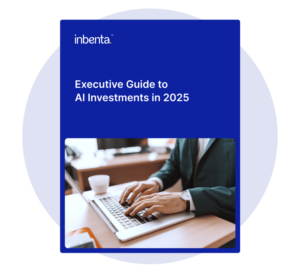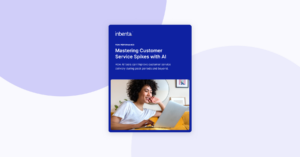Effective knowledge management can boost a company’s productivity by up to 40%. Implementing a knowledge management system (KMS) helps streamline information gathering, storage, and sharing across your business. Benefits include quicker access to information, fewer errors, reduced support costs, and happier customers. To choose the right KMS, look for user-friendly features, SEO capabilities, and strong reporting tools, such as those offered by Inbenta’s AI-powered technology.
Knowledge is power. It’s the key asset in every company, what allows your staff and your organization to perform. But what is knowledge management and why is implementing a knowledge management system so important?
Poor knowledge sharing costs Fortune 500 companies $31.5 billion a year, according to International Data Corp. (IDC). On the other hand, 74% of organizations estimate that effective knowledge management increases their productivity by up to 40%.
So what is knowledge management?
It’s a framework to create, access and share a company’s knowledge — its content, documents, training modules, and more.
What is a knowledge management system?
A knowledge management system (KMS) usually refers to the technology that lets a business gather, store, organize, retrieve, and share knowledge across the organization and with its customers.
Knowledge management systems can take various forms. Some common examples:
-
- Frequently Asked Questions (FAQ)
- Community forums
- How-to articles and tutorials
- Education portals and training programs
Why implement a KMS?
Lew Platt, former CEO of Hewlett-Packard, once said: “If HP knew what HP knows, we would be three times more productive.”
Too often, a company’s knowledge is undocumented, hard to find, and at risk of disappearing completely.
Knowledge is hard to access
Teams often use different apps across the same company, so information can become siloed and fragmented. This makes it hard to find when customers or agents need it most. As a result, knowledge workers often find themselves looking for or recreating information that already exists.
Smooth knowledge transfer is hard
When employees retire or leave a business, they may take with them what amounts to decades of company knowledge. Even if they train their replacement before leaving, departing employees are never able to pass on everything they know because some knowledge is tacit. Having a process in place can help capture that tacit knowledge, which might otherwise fall through the cracks.
Decentralized information makes the task even harder
Knowledge stored in emails or on local drives can disappear due to system failures or devices getting lost or stolen.
All these situations are inevitable. It’s why a proper knowledge management system is so important.
Upgrade your company’s knowledge management. BOOK A DEMO
So what are the benefits of knowledge management?
Speed up access to information
Knowledge management makes it easier to find the information — or the people with the information — you need. It increases efficiency and productivity and reduces the tendency to “reinvent the wheel.”
Make fewer mistakes
When employees aren’t sharing information, they’re doomed to repeat the same mistakes others have made. But this is avoidable when the lessons learned from mistakes and failures are easily accessible to everyone.
Decrease support costs
By giving support agents easy access to knowledge, a good internal KMS helps them perform their job better and more efficiently, which ultimately translates into savings.
Offered externally as a self-service portal (such as FAQs), a KMS lets customers help themselves when they need assistance with simple issues instead of requiring them to contact a support team. This relieves agents of handling common, repetitive requests, and lets them focus on more complex issues. It lowers support costs and can also help deal with high-volume periods.
It is relatively expensive to have a customer support rep interact with a customer for each and every issue. According to Forrester, a chat with a live customer support agent can cost $6-12 per interaction, but an automated interaction can cost as little as 25 cents.
Increase customer satisfaction and ROI
Nearly 70% of customers now expect a company’s website to include a self-service application, and 91% of customers try to solve their problems on their own before contacting the support team. By offering access to information through a knowledge management system or an AI chatbot, customers can resolve their problems faster, resulting in happy and successful customers.
And as we well know, happy and successful customers keep coming back to buy more (and more often). They also tell their friends about your brand, thus becoming enthusiastic brand advocates.
How to choose a knowledge management system?
Similar to a chatbot, a KMS can be powered by different technologies, which affect the performance and the quality of the results that users will receive.
Keyword-based KMS
A keyword-based KMS means the search engine will identify keywords in the user’s query and try to match these with the content loaded in the knowledge base. It can work fine, but the risk with these basic knowledge management systems is that they often push search results that are not relevant to the original query. How can that be? Simply because natural language is difficult for computers to understand. Queries can be ambiguous, and keywords alone may not be enough to interpret the user’s intent and deliver the right answer.
Symbolic-AI-powered KMS
At Inbenta, our Knowledge tool uses Neuro-Symbolic AI to power our Natural Language Processing (NLP) technology. Coupled with our Lexicons, this patented and proprietary technology lets our KMS understand users’ intent to present them with the best possible answers. This also means it can understand ambiguity, misspellings, even slang, for an even better customer experience.
Functionalities to consider
-
- Ease of use
Inbenta Knowledge is easy to get up and running and makes content management simple. Whether you need to add, edit, or organize content, you can do autonomously in our Workspace.
-
- Search Engine Optimization (SEO)
Implementing Inbenta Knowledge, which has built-in SEO features and lets your public content (such as Frequently Asked Questions) be crawled and indexed by Google, will also improve your ranking on SERPs.
-
- Powerful reporting
Inbenta Knowledge comes with a robust back-office that lets you monitor the performance of your knowledge through a dashboard that provides a real-time view of all the key indicators you need. This powerful tool can also help you detect potential gaps in your content and discover areas of improvement.
In Brief:
-
- An effective KMS enhances productivity and efficiency by up to 40%.
- Examples include FAQs, community forums, how-to articles, and training programs.
- It gives customers and employees quick access to necessary information and minimizes repeated mistakes.
- It lowers support costs through self-service and addresses documentation gaps and knowledge silos.
- It centralizes and simplifies access to information.
- Look for ease of use, SEO capabilities, and robust reporting tools.
- Consider AI-powered technology for better performance and quality results, such as Inbenta’s Neuro-Symbolic AI.
Discover how AI can revolutionize your knowledge management and your customer experience. Contact our team of AI experts.










